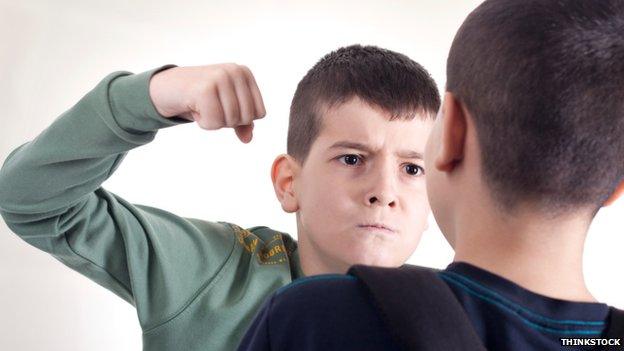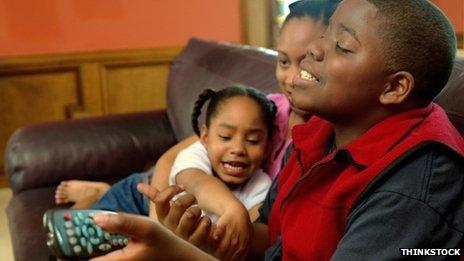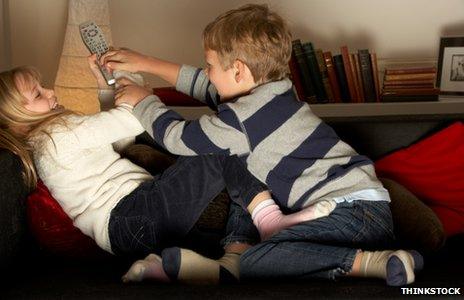Bully in the next bedroom - are we in denial about sibling aggression?
- Published

Siblings routinely pick on one another, but when does bickering become bullying - and what can parents do about it?
Sibling relationships can be difficult, and never more so than in childhood. But society often regards the scrapping and squabbling, the play fighting and not-so-playful fighting as a normal part of growing up.
"The public brushes off aggression between siblings as just rivalry," says Corinna Tucker of the University of New Hampshire.
Tucker is the lead author of a new study on the issue for the journal Pediatrics. Almost a third of the 3,600 children questioned said they had been the victim of some sort of sibling aggression in the past 12 months. The included a range of acts from theft and psychological abuse to physical assault, either mild or severe. In comparison, research suggests that up to a quarter of children are victims of schoolyard aggression every year.
Corinna Tucker uses the term "sibling aggression" in her study, but psychologists are increasingly reaching for a familiar label for the bad stuff that goes on between brothers and sisters - bullying. This is defined by experts as intentional acts of aggression, repeated over a period of time, where an individual or group is in a position of power over someone.
So sibling relationships would seem the perfect breeding ground for bullying, since children live together for a long period of time and there is usually an intellectual and physical power imbalance. Although there might not be an outright malevolence, there is often reason for jealousy.
"A sibling relationship is emotionally intense - it's one of those relationships where you can love them and you can hate them at the same time," says Tucker. "And siblings are natural competitors for family resources and parents' attention."
Laura - who grew up in a house she shared with four siblings and a foster brother - did not consider it bullying at the time, but now thinks the term captures what went on in their house in Ohio.
"My older brother - I would say he beat up on all of us," she says, her voice breaking. Although he never hurt them badly, he liked to wrestle his sisters, pinning them to the floor. "He was bigger and stronger than us - he could put us in very powerless situations. It was really scary."
For her brother, she believes, the activity gave him a momentary sense of control at a chaotic time for the family. Her mother, who had depression, had left home.
The children were all particularly mean to the youngest sister Tracy, the focus of their mother's attention. In the afternoons, after school and before their father came home from work, they would tease Tracy until she phoned her mother to try to get them to stop.
"I remember us saying to her: 'Mum can't do anything about it - she isn't coming here,'" recalls Laura. "And my dad - I think he was so overwhelmed that he only ended up dealing with the most serious things."

Where is the line between play-fighting and aggression?
There is a growing recognition of sibling bullying. One paper published this spring in the Journal of Interpersonal Violence highlighted ways in which it differs from playground or cyber bullying.
Twenty-seven pairs of adult siblings were questioned about how they had treated each other during childhood. Most reported they had been bullied, with around a third saying it had gone on for several years. About three-quarters of the sample said they had been both bully and victim.
Despite the aggression, victims and perpetrators gave high ratings for closeness, both before and after the incidents they described.
Most strikingly of all, a majority viewed it as acceptable and almost all the respondents - 85% - said such behaviour should be expected.
"From the young person's perspective and the parent's perspective, we do expect that siblings are going to fight with one another," says Robin Kowalski, the lead author of the study. "But there's normal discord within sibling relationships, and then there's bullying. And I can't tell you where that line is."
Corinna Tucker says that some parents believe conflict between siblings can be healthy since it teaches them how to handle difficult situations. But her study, based on the large telephone survey of children, showed that children who reported recent sibling aggression were more likely to be suffering from mental distress.

Siblings said they were close, even if they bullied each other
Research led by Dieter Wolke at the University of Warwick on large samples of British and Israeli schoolchildren has found that half the children who suffered from sibling bullying also suffered bullying at school - and that this group was particularly at risk of unhappiness or developing behavioural problems.
"If you only have sibling bullying or school bullying you are about 2.7 times more likely to have behaviour problems, but if you have both then it's 14 times more likely," says Wolke. "And the point about this is that you don't have any escape. It's 24/7."
Little is known about the long-term effects of sibling bullying but Jan Parker, a family psychotherapist and a co-author of Raising Happy Brothers and Sisters, is certain that they can be "serious and lifelong".
"We're very familiar with discussions on the impact of [school] bullying," she says. "I don't think it takes a great imaginative leap to understand the impact of it happening within your own home. You feel that you are not only let down by the person bullying you, but also by the adults in your life that are letting it go unchecked."
While sibling fights are normal, parents need to be aware of a pattern developing over time, she says. Parents are advised to talk to the children about what's happening. If they are worried, they could speak to a health professional.
They should also consider what might be causing the problems. "There is one known predictor - it's when siblings perceive there to be a wide disparity between how they are treated and how their brother and sister are treated," she says.

Rough and tumble is an important part of child development
Play fighting is valuable, since it teaches them what the limits of acceptable behaviour are, says Dieter Wolke. It should be clear to parents when children go too far because they haven't learned the limits - and when they do it on purpose. Parents should be loving but firm, with clear rules, he says.
Laura believes that the bullying in her house happened because her parents failed to intervene, because they were too preoccupied with their own issues. "We were so overwhelmed and there was so little adult support to find ways to resolve conflict," she says.
She is now 48 and a recovering alcoholic. In adulthood, she established a good relationship with her siblings. She describes the grown-up Tracy as "very strong" and her older brother as a "gentle man".
But like some of her siblings she had therapy. Some of her problems, she says, are due to feeling abandoned by her parents. But there are other issues which she relates directly to the sibling bullying - a learned helplessness and a tendency to avoid conflict.
This is a problem for her professionally, since her job sometimes requires her to turn down applications for funding, which means having tough conversations. "These are really difficult situations for me," she says.
"It sucks to be a middle-aged woman and not know how to do this stuff that you're supposed to learn when you're a teenager."
Some names have been changed to protect individuals' identity.
Follow @BBCNewsMagazine, external on Twitter and on Facebook, external.
Robin Kowalski spoke to Health Check on the BBC World Service - listen again to the programme on iPlayer or get the Health Check podcast.